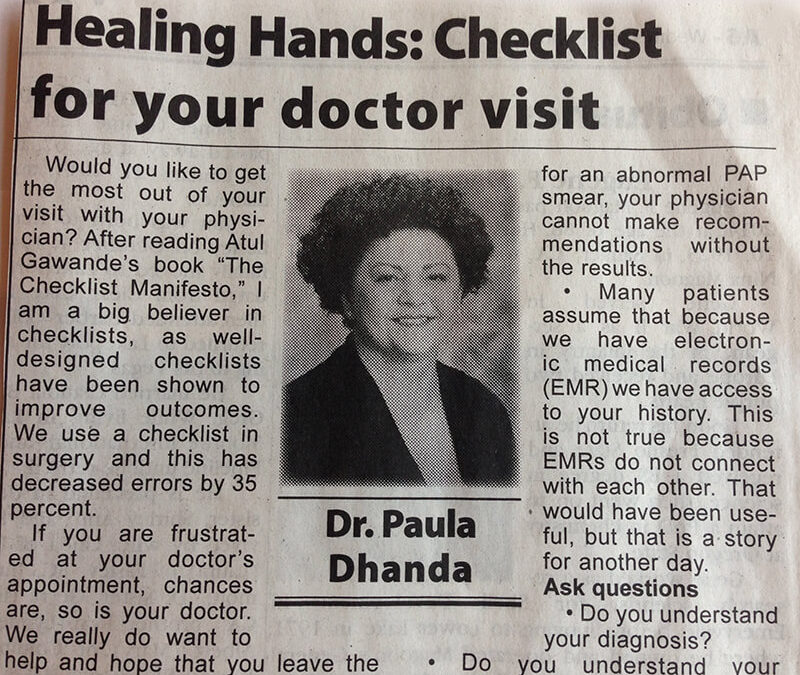Would you like to get the most out of your visit to your physician? After reading Atul Gawande’s book The Checklist Manifesto, I am a big believer in checklists as well-designed checklists have been shown to improve outcomes. We use a checklist in surgery and this has decreased errors by 35%.
If you are frustrated at your doctor’s appointment, chances are, so is your doctor. We really do want to help and hope that you leave the encounter feeling like we are working together towards the same goal – your good health. So turn off your cell phone and lets get ready for your doctors appointment:
Be prepared:
- Make sure you know why you are visiting your physician and start with the most important concern that you have (chief complaint). It may be helpful to make a list of your concerns but don’t not make it too lengthy. Prioritize what is most important to you and perhaps highlight your top three concerns. Don’t wait till your physician is on the way out the door to say “by the way” and then proceed to ask your most important question.
- Take a list of your medications and any allergies to medications, especially when you are seeing a new physician. This should include over-the-counter medications and supplements. If you do not have a list take all your bottles of medications with you. This reduces the risk of medication errors.
- Keep a list of your medical problems and any surgeries you have had including the dates. Start now by recording everything you remember and then keep it up to date.
- Keep a copy of medical tests or at least know where they were done so your physician can obtain them if needed.
- When visiting a new doctor, it is helpful to take a copy of your pertinent medical records or have them sent to your physician ahead of time. This will save time and extra visits. For example, if your visit is for an abnormal PAP smear your physician cannot make recommendations without the results.
- Many patients assume that because we have electronic medical records(EMR) we have access to your history. This is not true because EMRs DO NOT connect with each other. That would have been useful but that is a story for another day!
Ask questions:
- Do you understand your diagnosis?
- Do you understand your options?
- If surgery is recommended do you understand the procedure and the risks? How long will you be in the hospital and how long is the recovery time? What are your restrictions after surgery?
- If medications are prescribed do you know what they are for and how to take them? Are there any side effects or things you should watch for?
- Is there any written information your physician can give you about your condition to read at home? The Internet is full of information, some good and some downright harmful or misleading.
- If tests are ordered, understand why it is being done. Ask when and how you will get the results? Don’t assume that “no news is good news.”
Never be afraid to ask questions if something is unclear to you. It is often helpful to have a family member or friend with you, especially if you are facing a serious medical problem or surgery. Be an informed patient and participate in your care. As medicine becomes more complex your participation in your care becomes more important.
This column is no substitute for seeing your own health care provider.
Dr. Paula Dhanda is a practicing physician in Kelseyville. She is the founder of Worldwide Healing Hands. She may be reached at 279-8733 or visit https://drspecialtycare.com/ or http://www.worldwidehealinghands.org/.
Published in the Lake County Record Bee

